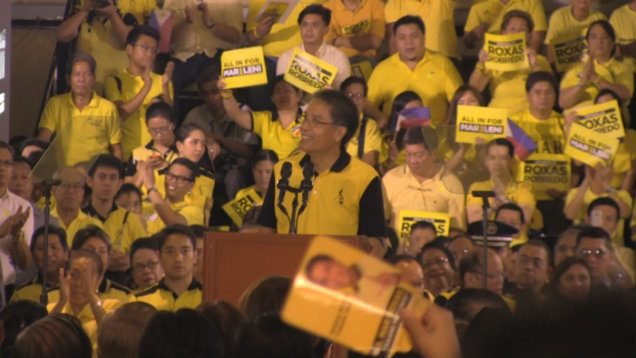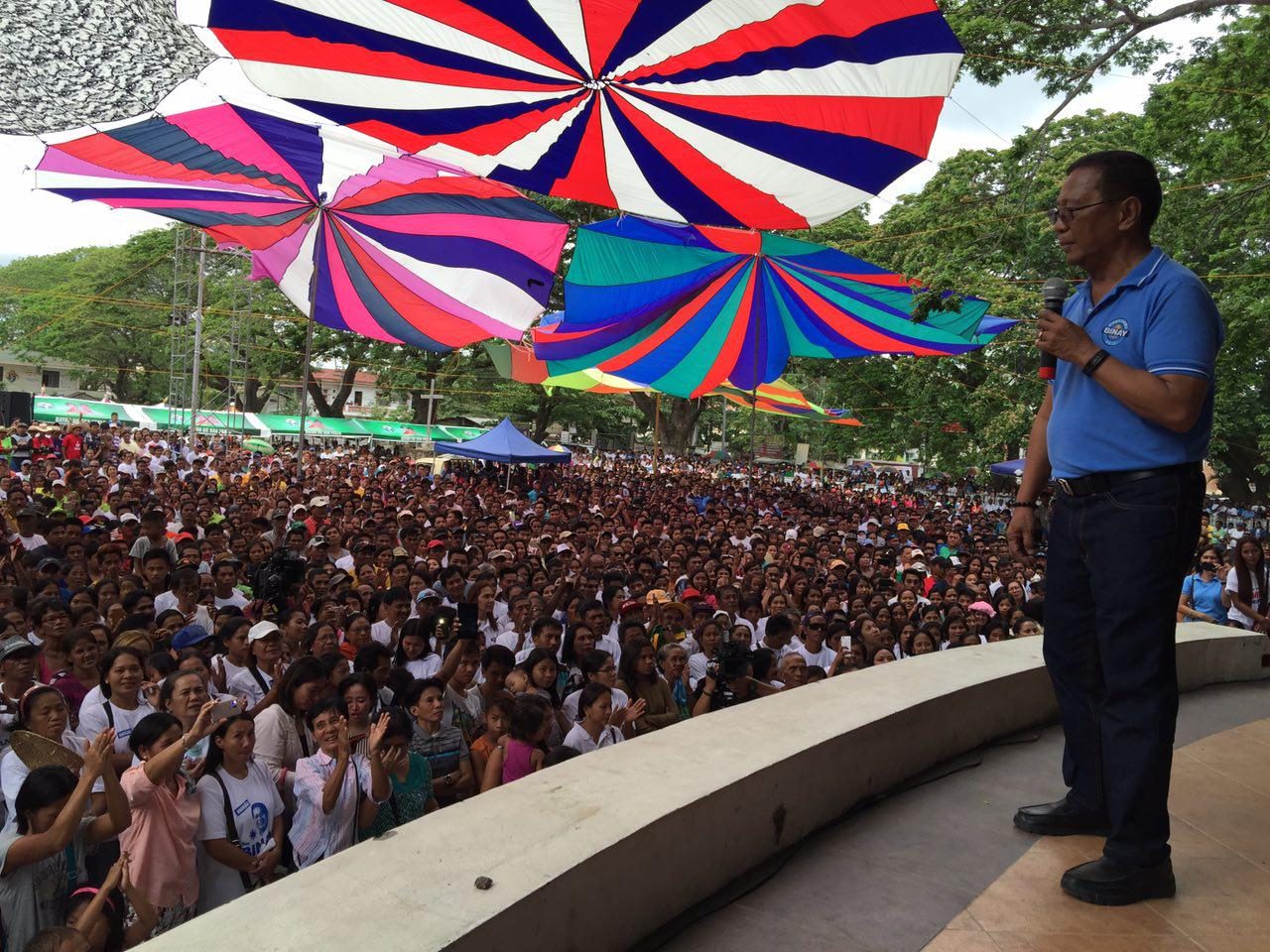SUMMARY
This is AI generated summarization, which may have errors. For context, always refer to the full article.

The historic Club Filipino was sardine-packed on April 14 as President Aquino, members of his Cabinet, lawmakers, governors and mayors belonging to the Liberal Party (LP) as well as non-LP allies, with civil-society organizations gathered for a rousing last-stretch campaign for Manuel “Mar” Roxas II and his running mate Leni Robredo.
The main hall of Club Filipino swam in various shades of yellow, spilling out into the hallways, restaurants and adjoining rooms. The fierce summer heat added to the intensity of the event, really a show of force of the ruling coalition.
The campaign troops may have needed this to boost their morale, to feel that, despite the lackluster showing of Roxas in the polls – he placed 3rd, tied with Jejomar “Jojo” Binay, in the March 29-April 3 Pulse Asia survey – they still have a shot at victory.
(Another April survey by the Social Weather Stations using mobile phones shows Roxas and Binay tied for the distant 2nd place, with Rodrigo Duterte and Grace Poe tied for the top slot. ABS-CBN’s latest survey from April 5 to 10 showed Roxas still behind Duterte, Poe and Binay)
In the crowd was Gerardo “Gerry” Bulatao, agrarian reform advocate mobilizing farmers for Roxas and Robredo. For him, “the importance of this event is the declaration of support of the governors, congressmen and mayors.”
Former Senator Ramon “Jun” Magsaysay Jr., who was among those avidly cheering, told me that the LP machinery could add about 5% to 7% to Roxas’s numbers. “But we need more fervor,” he added, compared to the Duterte camp which has “lots of fervor but has no machinery.”
Binay’s fearless forecast

Even before the Club Filipino hoopla, Binay already framed the last stretch of the campaign as a race between him and Roxas because both have the machineries to deliver votes .
Binay used to top the polls early in the campaign but his numbers dove as he was hounded by corruption charges. He dismissed the recent surveys where his popularity ebbed, pointing out that frontrunners Duterte and Poe, being newbies in a national campaign, do not have the massive organization needed to churn out the votes.
But does Binay still have his old machine? Political clans like the Garcias of Cebu have dumped him.
Last year, the sister-city deals Binay worked hard on and which proved effective in his 2010 campaign for vice president were stopped by acting Makati Mayor Romulo “Kid” Peña.
Roxas may have the machine needed to win but, so far, he has not topped any survey. He was quoted as telling local officials in Palawan: “The point is our numbers in the survey can still be shored up by your campaigning on the ground. That is the machinery. You can convince people, and more importantly, you will be the ones who will also help them get to the polling precincts come election day.
‘Empowering’ machine?
What, really, is this machinery all about?
LP is banking on its local candidates who are running unopposed (40% of the more than 500 uncontested posts) and non-LP local politicians who have endorsed Roxas – Pampanga Governor Lilia Pineda, Bataan Governor Hermogenes Ebdane Jr, Pangasinan Governor Amado Espino Jr, and others.
Moreover, LP stalwart Florencio “Butch” Abad explained to me that the nature of the machinery has changed under the Aquino administration. It is no longer a machine built out of patronage, said Abad, who is also budget secretary, but one that has “empowered” local officials. “Not one province, district, or city can complain that they were neglected [under Aquino]” in the delivery of programs like universal health care, conditional cash transfer, rural electrification and infrastructure.
“The big change is, whatever their party affiliation, they [local officials] were provided basic programs. They did not have to beg for it and they did not need to change parties. They genuinely appreciate this and want it to continue,” Abad said.
Thus, he continued, how else to explain the shift in support of the likes of former allies of President Gloria Arroyo (Pineda and Ebdane) and Espino of the Nationalist People’s Coalition?
But there’s one big missing ingredient in the Roxas campaign: the presidential candidate’s popularity. His numbers have plateaued and the campaign has not gained its much-needed momentum.
Machines failed
In post-Marcos presidential elections, we saw how supposedly formidable machines failed to deliver votes, faced with rival candidates’ popularity and the context of the times.
In 1992, Ramon Mitra, backed by the Laban ng Demokratikong Pilipino which had majority of the congressmen and an impressive number of governors and mayors, lost to Fidel Ramos, a soldier endorsed by then President Corazon “Cory” Aquino who was hugely popular following the historic Edsa 1 uprising.
This epic failure repeated itself in 1998, this time with Jose de Venecia, shored up by the Lakas-National Union of Christian Democrats, losing to movie actor Joseph Estrada, whose popularity was unbeatable.
More recently, in 2010, Gilberto Teodoro was endorsed by the ruling party Lakas-Kampi-Christian Muslim Democrats. A strong anti-corruption sentiment and an unexpected twist of fate, the death of Cory Aquino, propelled her son, Benigno “Noynoy” Aquino III, to the presidency.
It was only in 2004 when the machine whirred to life. The incumbent, President Arroyo, won over Fernando Poe Jr. Political scientist Julio Teehankee reminds us that Arroyo’s survey ratings overtook Poe in the last stretch of the campaign, thus providing the vital mix of popularity and machinery.
In these heated remaining weeks to election day, things could still change – but lessons from the past will not. – Rappler.com
“The Scrum” is Rappler’s take on issues and personalities of the 2016 elections. Derived from a media term that refers to reporters surrounding politicians to press them to answer questions and respond candidly, “The Scrum” hopes to spark smart conversations on politics and elections.
Add a comment
How does this make you feel?





There are no comments yet. Add your comment to start the conversation.